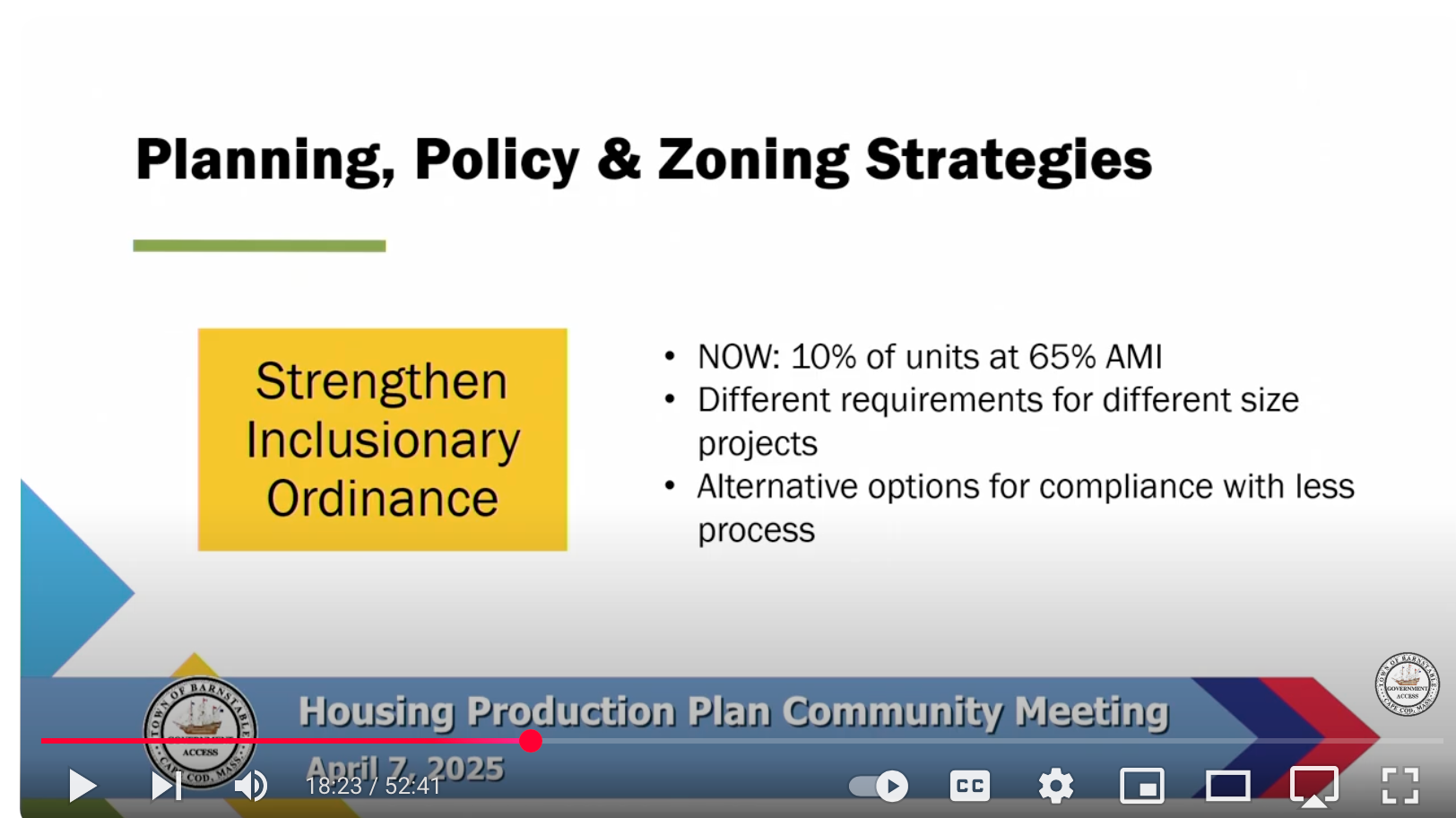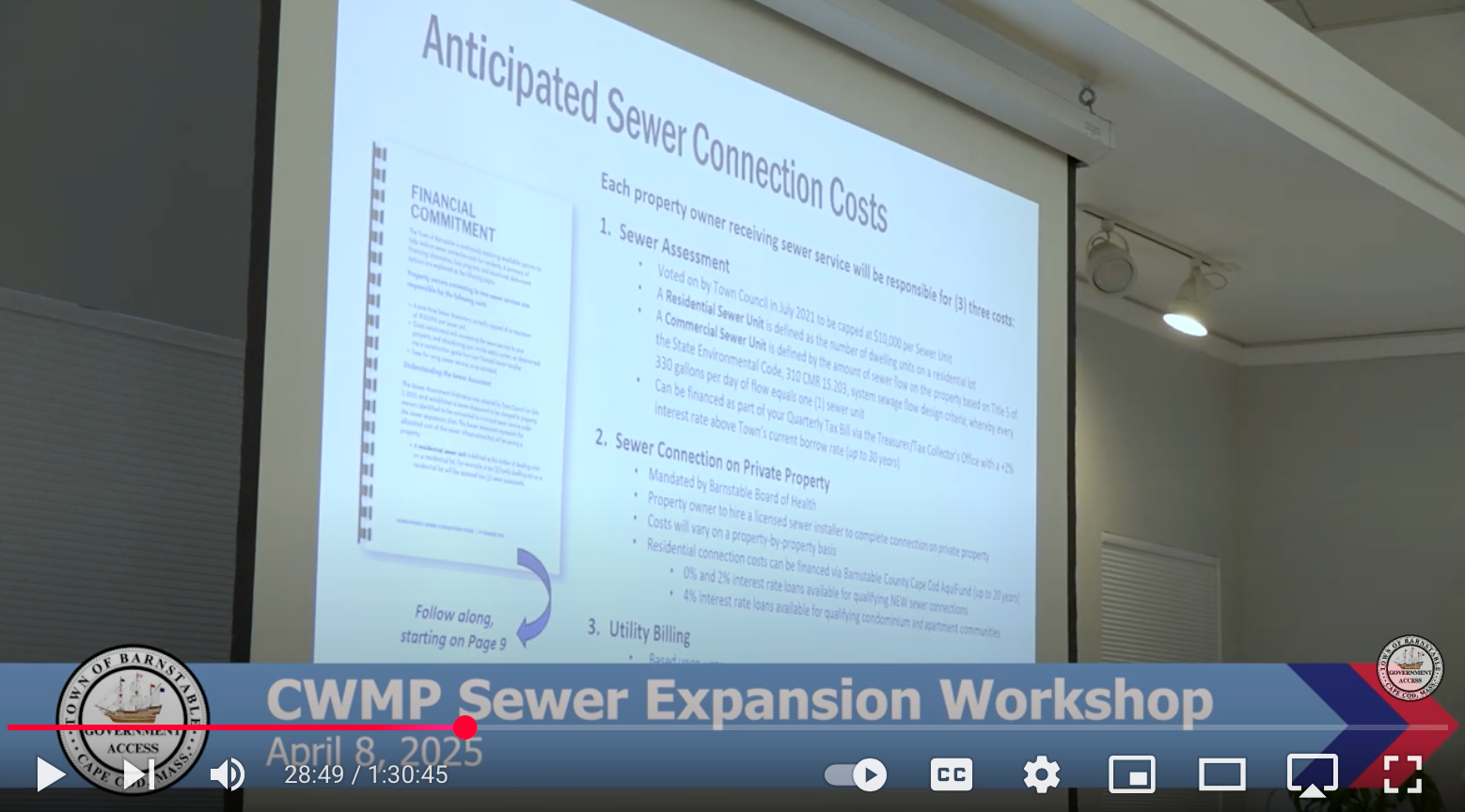Barnstable Meetings | 2nd week of April 2025 | Plus: Upcoming Public Meetings on the 10-Year Town Plan in April & May
Housing Production Plan Community Meeting | April 7, 2025

Watch the meeting. AI supported summary below. Corrections welcome.
This meeting focused on Barnstable's Housing Production Plan (HPP), its strategies to address affordable housing needs and sought public input for its refresh. Public comment is open through May 1, 2025. Go to the town website under "Housing" then "Housing Production Plan."
Link to the comment box on the Town website.
Key Points
- HPP Defined: The HPP is a proactive strategy for planning and developing affordable housing, guided by Massachusetts' Executive Office of Housing and Livable Communities requirements (760 CMR 56.034). It requires a comprehensive housing needs assessment, affordable housing goals, and an implementation strategy.
- Purpose of the Meeting: To discuss the HPP, gather public comments on what the town has done well and where it can improve.
- Three Requirements of HPP:
- Comprehensive Housing Needs Assessment (data-driven)
- Goals and Strategies (how to meet needs)
- Action/Implementation Plan (specific projects, programs, incentives)
- Review Process: The plan is reviewed and approved by the Planning Board and Town Council before being submitted to the state's Executive Office of Housing and Livable Communities.
- Data Update: The plan is being refreshed with updated data from the 2020 census. Previous community workshops highlighted the difficulty in finding moderately priced and deed-restricted affordable housing, the needs of seasonal workers and seniors, wastewater constraints, and zoning restrictions.
- Demographics:
- Number of households has decreased.
- Total population has increased.
- The proportion of adults over 60 has increased significantly.
- Most households are one- or two-person households.
- A quarter of the community is seasonal.
- Affordability is a major concern, with many homes being cost-burdened (30%+ of income spent on housing).
- "Tools in the Toolbox":
- Zoning: Can implement policy objectives, but can also be a barrier. Accessory Dwelling Units (ADUs) have seen 44 completions since 2021. Downtown Hyannis zoning initiative has permitted a significant number of units.
- Subsidies/Incentives: Affordable Housing Growth and Development Trust, Housing Development Incentive Program (tax relief), Housing Choice Community grants (e.g., Crocker Street sewer project).
- Municipal Land: Utilizing town-owned land for affordable development (e.g., Marson's Mills former school site, Barnstable Adult Community Center, house on the hill in Marson's Mills).
- Goals and Strategies:
- Meeting the state's mandated goal of 10% affordable housing (currently at 7.15%, which equates to needing roughly 700 units).
- Ensuring new development promotes a high quality of life and aligns with smart growth policies.
- Stabilizing housing and providing assistance for vulnerable residents.
- Enhancing local capacity and public awareness.
- Strategies (Planning, Policy, Zoning):
- Tax exemptions for year-round rentals.
- Village-scale mixed-use and multi-family housing.
- Strengthening the inclusionary ordinance (requiring a higher percentage than the current 10%).
- Targeting underutilized properties.
- Reviewing short-term rental policy.
- Direct assistance and housing rehab programs.
- Regionalizing efforts (e.g., regional housing services office).
- Diversifying funding sources.
- Public Comment: The public is encouraged to provide feedback on the HPP through the town website (under "Housing" then "Housing Production Plan"), email, letter, phone, or in person. Public comment is open through May 1st.
Highlights
- The need to increase the inclusionary zoning percentage beyond 10% was a major point of discussion.
- Concerns were raised about the character of villages and the potential impact of certain zoning changes.
- Several speakers emphasized the importance of addressing short-term rentals to increase the availability of year-round housing.
- The current plan was described as a "kitchen sink" approach and needing more focus and precision.
- The town's unique designations (Gateway City, Housing Choice Community) offer opportunities for specific programs.
- The speaker acknowledged that the state mandated 10% may not be the actual number needed to meet the community's housing needs.
Comprehensive Wastewater Management Plan - Sewer Expansion Workshop | April 9, 2025

Watch the meeting. AI supported summary below. Corrections welcome.
This workshop provides an update on Barnstable's Comprehensive Wastewater Management Plan (CWMP) and related sewer expansion project. The goal is to address coastal water impairment caused by nitrogen and meet regulatory requirements.
Key Points
- The Problem: Coastal waters are impaired by nitrogen, leading to groundwater and pond water quality concerns. This also impacts economic development and necessitates regulatory compliance.
- Regulatory Compliance: The town must meet Total Maximum Daily Loads (TMDLs) for nitrogen. Septic systems are a major source (78%) of controllable nitrogen. New Title 5 regulations and watershed permits are key aspects of compliance.
- Watershed Permit: Barnstable is the first town in the state to apply for a watershed permit under the new regulations. This permit allows the town to implement its CWMP instead of requiring individual homeowners in nitrogen-sensitive areas to upgrade to expensive alternative septic systems.
- CWMP Implementation: The CWMP is a 30-year plan divided into three 10-year phases. The town is currently in year four of phase one. Two construction projects have been completed on time and on budget.
- Phase 1 Goals: Focus on sewer expansion along Route 28, adjacent to impaired ponds and lakes in Centerville, addressing economic development needs, and sewering flood zones.
- Sewer Connection Process: Homeowners will receive a sewer connection form to indicate their preferred service location. Licensed sewer installers will handle the connection and septic system abandonment.
- Financial Resources: The town offers options to finance the sewer assessment through property taxes. The Cape Cod Aqua Fund provides low-interest loans for sewer connections.
- Communication and Outreach: The town uses mail, email newsletters (E-News), in-person meetings, and door-to-door outreach to communicate with residents. The barnstablewaterresources.com website provides comprehensive information. The town is working on an interactive map to allow residents to proactively find out information about sewering in their area and neighborhood.
- Website Resources: The website includes information on the CWMP, phase one projects, sewer connection process, anticipated costs, alternative technologies, water quality monitoring, FAQs, and reports/documents.
Comprehensive Financial Advisory Committee - Operating Budget Subcommittee | April 9, 2025

Watch the meeting. AI supported summary below. Corrections welcome.
The meeting focused on reviewing the draft school budget, discussing demographic shifts impacting the school system and budget, and planning for the completion of the overall operating budget report.
Key Points
- School Budget Draft Review: The committee reviewed themdraft of the school budget, focusing on the accuracy of numbers and analysis.
- Fixed Costs: The discussion highlighted the importance of including fixed costs (employee benefits, etc.) when considering the school budget, as the 60% often discussed doesn't represent the entire financial commitment.
- Demographic Changes: A significant portion of the meeting centered on the changing demographics within the Barnstable school system, particularly the change in the student population and its financial implications. The rapid demographic shift in the school population over the past five years was identified as a significant factor impacting the budget and requiring careful consideration.
- Comparison to Other Districts: The comparison of Barnstable School District to other districts, especially regarding demographic differences and associated costs, was deemed valuable.
- Economic Uncertainty: The committee acknowledged the current economic instability and the need for caution in implementing the capital improvement plan, including reviewing figures and considering add alternates.
- Looking Ahead Section: Members were asked to contribute to the "Looking Ahead" section of the operating budget report, highlighting important points for the town manager and council.
- Data Sharing and Collaboration: The committee discussed the process for sharing documents and providing feedback on the budget drafts.
- Next Meeting: The next meeting was scheduled for April 23rd, with the goal of having draft reports completed by then.
Local Comprehensive Plan | Public Input Meetings in April and May
The Local Comprehensive Planning Committee (LCPC) is seeking public input on the town's draft local comprehensive plan.
The LCPC is holding community meetings to discuss the draft plan, which outlines goals, policies, and strategies for the next 10 years. Each meeting includes an overview of the plan followed by an "open house." A final townwide meeting will be held at Barnstable High School with Portuguese and Spanish interpretation and free childcare (K-5th grade).
Editors note: The draft LCP is more than 300 pages. The length makes it particularly challenging for residents who work, have family or other life commitments to read it and understand all it calls for over the next decade. The draft is a searchable document such that one can word search to focus on issues you consider most important.
PUBLIC MEETINGS

